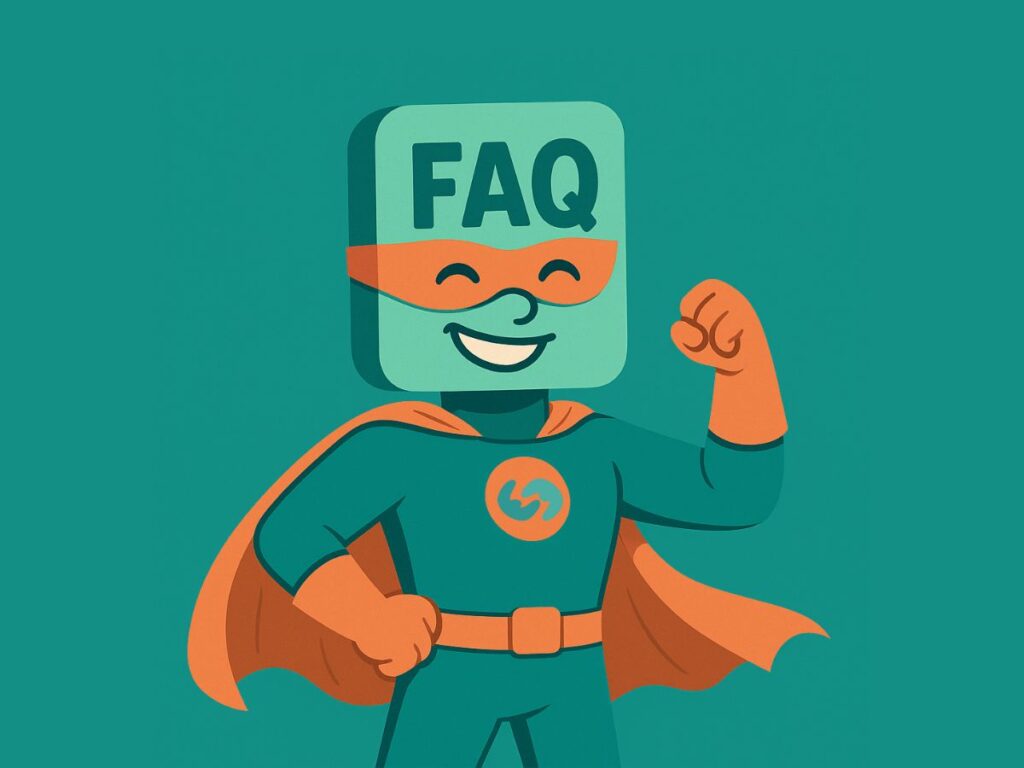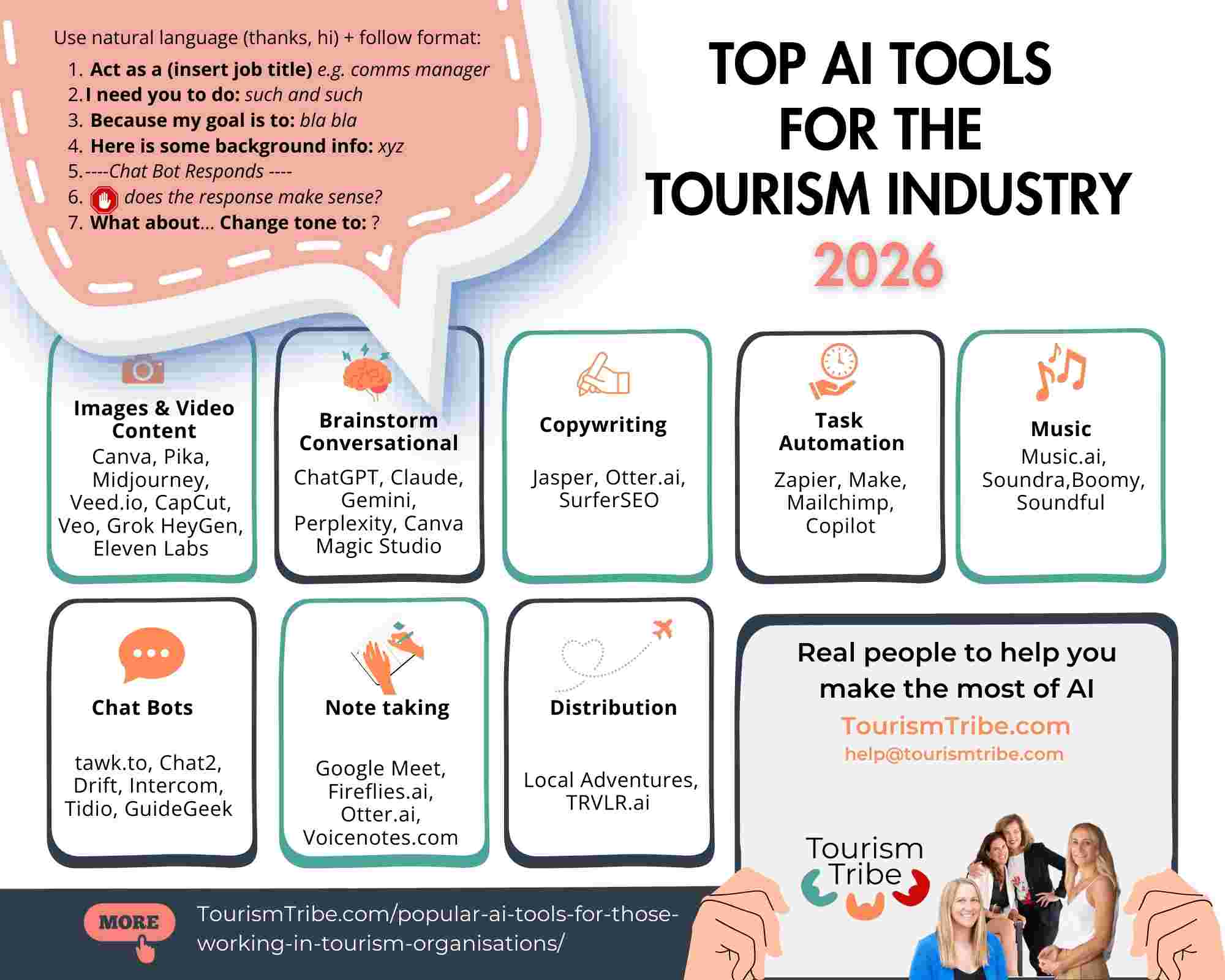$150.00 – $5,000.00Price range: $150.00 through $5,000.00

Let us help
Related articles
The unsung hero of tourism websites: how to write FAQs for tourism websites to drive more bookings
Last updated on July 23, 2025
They might not be the flashiest part of your website, but FAQs can be one of the most powerful. When done right, they’re more than just a list of questions, they’re trust builders, deal closers, and now, thanks to the rise of AI-powered search (GEO), a secret weapon for getting found online. So read on to learn more about how to write FAQs for tourism websites to be found in AI and traditional searches and convert.
Tourism businesses often pour effort into blogs and product pages while leaving their FAQs in the too-hard basket or quickly throwing them together. But in 2025, well-written, conversational FAQs are critical not only for answering common questions but also for helping customers overcome objections and take that final step to book.
In this guide, you’ll learn why it is important to:
- Write FAQs that reassure and convert
- Use schema markup so they’re found by AI tools
- Place them where they’ll have the biggest impact (hint: it’s not just one FAQ page anymore)
Then check out our next article in the series, Tourism Tech Session Recap: Smarter FAQs for AI Search Visibility and Better Bookings, where we explain how to turn your FAQs into one of the hardest-working parts of your website. Let’s give your FAQs the upgrade they deserve and start turning questions into bookings.
Why FAQs are making a comeback
FAQs (Frequently Asked Questions) are back in the game because customer behaviour has shifted. In the age of GEO (Generative Engine Optimisation), search engines powered by AI (like ChatGPT, Perplexity, and Google SGE) are looking for natural, helpful answers to real questions.
And guess what? Well-written FAQs do exactly that.
They’re now a key part of how people discover and decide on a product or service. Whether it’s a family booking a beach cabin, a grey nomad planning a 4WD adventure, or an international traveller trying to work out if your tour is kid-friendly, good FAQs can make or break the sale.
What does GEO mean and why does it matter?
GEO (Generative Engine Optimisation) is about making sure your content is found not just by traditional search engines like Google, but also by AI-powered assistants and search experiences.
These tools don’t work like Google used to. They summarise answers, pull from structured content (like FAQs), and serve up conversational content that sounds like it came from a real human.
If your FAQ page still looks like this:
Q: What time does the tour start?
A: 9am.
…you’re missing out.
AI won’t pick that up. Your customers won’t feel reassured. And your conversions will stall.
Let’s fix that.
The real job of your FAQs: Overcome objections
The biggest mistake we see tourism businesses make is treating FAQs like a checklist or a legal requirement.
In reality, your FAQs should be doing three important jobs:
- Answer real questions your customers are asking
- Reassure them and remove doubt
- Convince them this is exactly what they’re looking for
You’re not just answering questions like “Is breakfast included?” You’re removing objections like:
- “Is this going to be too hard for my kids?”
- “Will I be stuck on a bus all day?”
- “What happens if it rains?”
A well-written FAQ answers those things in a helpful, friendly tone like a great tour guide or concierge would.
Where to put your FAQs
Here’s where things get exciting. In 2025, FAQs should no longer live in isolation on your FAQ page at the bottom of your site.
Instead, use them across your website to improve both your SEO and your conversions:
- On product pages: Answer the most common questions about each tour, accommodation, or experience. Tailor these FAQs to that specific product, not your whole business.
- On blog posts: If you’re writing a blog about “Best things to do in Agnes Water with kids,” finish it off with a short FAQ that addresses the most common objections or planning hurdles.
- On service pages: Got a transport service or a multi-day package? Add FAQs that help with planning, packing, and preparation.
- On your main FAQ page: Still keep this, but use it as a directory or link hub for the more detailed product-level questions.
Make sure they’re visible, not buried behind an accordion menu five scrolls down.
How to write FAQs that convert and rank
Here’s the magic formula for writing high-performing FAQs that actually do some heavy lifting for your business.
1. Write like a human, not a robot
Keep your tone friendly, conversational, and easy to read. Imagine explaining it to someone at the visitor information centre.
Bad FAQ:
Q: Is parking available?
A: Yes.
Better FAQ:
Q: Where can I park when I arrive for my 1770 LARC! Afternoon cruise?
A: We’ve got free on-site parking for all our guests, and plenty of space for caravans and trailers. If you’re arriving late, just let us know and we’ll keep a spot reserved.
2. Use full questions
Don’t chop them up or write half-questions. Think about what someone would type or say into an AI tool and use those words (see above re parking example)
3. Use schema markup
This one’s for the nerds, but it matters. Schema markup is a bit of code that tells search engines “Hey, this is an FAQ.” It helps your answers appear directly in search results and is essential for AI search visibility.
4. Don’t guess – use real data
Look at your emails, DMs, reviews, and booking questions. What are people actually asking? Use those as your FAQs. You can even use tools like AnswerThePublic or Google Search Console to find common queries.
5. Tie back to the sale
Every answer should reinforce the benefits of your product and nudge people closer to booking.
Real-life example: Tour FAQ done right
Let’s say you run a whale-watching cruise.
Q: What happens if the weather is bad?
A: Great question! Safety’s always our top priority, so if the weather turns, we’ll either reschedule your cruise or offer a full refund, your choice. That said, Hervey Bay winters are usually calm and sunny, and we very rarely have to cancel. We’ll keep you in the loop the whole time. You can read an article we have written about inclement weather here.
Why this works:
It answers the question, sets expectations, builds trust, and subtly reassures the reader that cancellations are rare.
FAQs and AI search: A match made in marketing heaven
When your FAQs are written well and marked up correctly, they’ll start popping up in:
- Voice search results (e.g., “Hey Siri, is Agnes Water good for families?”)
- Google’s AI Overview boxes
- ChatGPT-style tools pulling answers from the web
- Rich snippets in traditional Google search
It’s like giving your website multiple front doors.
Final tips for FAQ success
✅ Use short paragraphs and plain English
This makes your content easier to read and more likely to be understood by humans and AI tools alike.
✅ Avoid jargon, explain it in simple terms
If you use industry terms, add a plain-English explanation so people (and search engines) don’t get confused.
✅ Update your FAQs regularly
Reflect seasonal changes, new policies, or updated service details so your info stays accurate and trustworthy. AI preferences fresh information.
✅ Include FAQs throughout your website
Adding FAQs to product, blog, and service pages helps answer relevant questions where they matter most and helps AI to understand your content.
✅ Write each FAQ with the goal of helping someone book
Don’t just inform, reassure and persuade. Help them imagine themselves having a great time with you.
Read our next article in on how to write FAQs for tourism businesses, Tourism Tech Session Recap: Smarter FAQs for AI Search Visibility and Better Bookings for more information on how to write FAQs for tourism websites.
FAQs
Why do I need an FAQ page for my tourism website?
FAQs help answer your visitors’ most common questions while building trust, removing doubts, and nudging them toward booking. They also help your content get found in search engines and AI tools.
Can FAQs really improve my booking rate?
Yes, well-written FAQs address concerns like safety, accessibility, and suitability. When customers feel informed and reassured, they’re more likely to book.
How many FAQs should I have on my FAQ page
There’s no magic number, but quality matters more than quantity. Aim for 8–12 strong, well-written questions that cover the most common concerns. You can group them by category (e.g., “Before You Book,” “On the Day,” “Accessibility”) or link to more detailed FAQs on specific product pages.
What is the official documentation for FAQs?
View the official Google documentation with regards to FAQ schema here.
Let us help you get it sorted
If you know your FAQs could be doing a better job – both for Google and for your customers – we can help with our tech support and development hours. We recommend you select either a 2h or a 3h option to help you boost your FAQs.
We will do a review of your site and content management system and provided we have the right access will be able to:
- Research and write AI-friendly FAQs written in your brand’s voice
- Set up the FAQ schema markup and provide so your answers are found in AI search
- Provide a clear plan for where to place extra FAQs across your site
- This will support better conversions from your tour and accommodation pages
Or, wondering if your business is optimised to show up in AI searches? Get a Generative Engine Optimisation (GEO) assessment of your online presence.
Get in touch today and let’s make your FAQs your best salesperson.
Where to from here?
Top AI Tools for the Tourism Industry - Free cheatsheet

+ Bonus Cheatsheets & Templates
Opt-out any time, no hard feelings.
Julia Retson
Julia is our Operations Manager, bringing sharp technical expertise and a strategic mindset to everything from website management and marketing automation to data reporting and workflow optimisation. She ensures our systems run smoothly and support both a seamless customer experience and informed business decisions. With a background in visual effects, STEM education, and graphic design, Julia has a knack for making complex tools simple to use. She holds a degree in Aerospace Engineering and qualifications in education and design. Originally from Canada, she’s travelled extensively—including a year caravanning around Australia with her young family.
